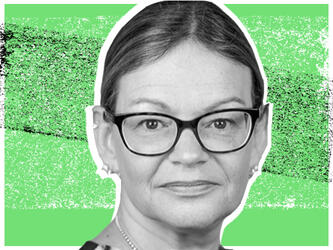Staying out of the way
Online communities and bulletin boards are re-writing the rules of engagement as companies conduct their own conversations with their consumers. Qualitative researchers are becoming more passive – ‘facilitators’ rather than ‘moderators’. In quantitative research, survey tools allow clients to script a questionnaire one day and see results the next. With these tools at their fingertips, why should they need researchers at all?
The researcher’s role will never become entirely defunct because it is not purely functional. Researchers do more than just connect internal clients with respondents. They occupy a distinct position and have an entirely different skill set to client marketers. The very strengths which make an effective marketer (thorough understanding of, and immersion in, the market and a tenacious belief in their brand’s values) can make it hard to step into the researcher’s shoes.
Our nature as human beings is to focus on facts which support our entrenched perceptions, overlooking those that challenge them. As the communications scholar Marshall McLuhan once said, “I wouldn’t have seen it if I hadn’t believed it.” Brand advocates, when carrying out and analysing research, are more likely to focus on areas and outcomes which support their beliefs or stance on a topic. It can be challenging for someone whose role is about persuading others to believe their brand messages to shake off this view, particularly in response to critical feedback.
Don’t take it personally
I recently saw an exchange between a brand manager and a member of an online community that illustrated this. The customer said she would be unlikely to try the retailer’s new ‘own brand’ product line – she didn’t like the packaging and assumed that it would be of poorer quality than its ‘big name’ competitors. The client responded by saying that the product was actually of a very high quality, in fact, he even bought it himself. A natural enough response from the person responsible for the brand in question, but not one that was going to encourage an honest exchange of views. We’ll never know what other insights this respondent might have had to share – she recoiled into her virtual shell at a response which sought to convince rather than explore.
“Research is not about being persuasive or zealous – it’s about opening one’s mind to what consumers believe to be the truth, even if this jars with our own view”
Communities are challenging researchers’ traditional skills, too, as we adapt to being involved in more natural conversations. Some suggest that we should become brand evangelists in this setting but I struggle to see how this would benefit clients. Research is not about being persuasive or zealous – it’s about opening one’s mind to what consumers believe to be the truth, even if this jars with our own views. The independence of researchers allows respondents a level of honesty in expressing these truths, which they wouldn’t have when speaking to a brand advocate. To a researcher, negative feedback does not feel ‘personal’.
True, the notion that any of us – researcher or otherwise – can be truly objective has long since been disproved. We are all consumers, with distinct experiences and beliefs which shape our view of the world. But it is the researcher’s particular perspective – one step removed from clients’ brands – which give us our clout; our usefulness in interpreting results. We act as an independent, regulated voice, unfettered by internal politics. We are still, inevitably, subjective, but our focus is wider – we help clients make sense of insight within the macro context. Clients contextualise results and drive action within their organisations – building up the nest – whilst agencyside researchers have ‘magpie’ working lives, continually hopping from one project to the next, bringing the spoils (our evolving knowledge base and learnings from wider markets and consumers) with us.
Part art, part science
There is no doubt that the researcher’s habitat is changing and evolution is crucial to survival. So how should we adapt? Should the role of researcher become one of observation and analysis only, whilst others do the interacting? This might work on the proviso that, if clients could ask the right questions, respondents would be able to give them the information they need. But good researchers don’t simply ‘ask’. Effective research is part art, part science. Its design is based on what clients need to know and what participants are actually capable of telling them. Researchers question appropriately in order to elicit the desired information. Even the words chosen must be carefully considered – the acronyms and sector jargon that are mother tongue to a marketer can sound like gibberish to a consumer. Take the phrase ‘brand values’ – it’s widely understood and used in marketing but, when a client recently posed an end-of-group question asking respondents about the values of his brand, the only response was a lengthy silence and eight blank expressions. It takes practice to become truly effective at moderating or designing fieldwork documents and not all clients have the time needed to develop these skills, and polish them with frequent practice.
“What every moderator wants is for the people participating in research not to feel like they are”
As a moderator, nothing gives me a greater sense of satisfaction than when respondents comment that they “expected it to be all questions and answers but it was just us having a conversation really” or when they’ve asked me to stay for tea and cake because they’re enjoying chatting. What every moderator wants is for the people participating in research not to feel like they are. By establishing a rapport, I’ve been allowed access to very personal experiences – financial ruin, health problems, poor diet and lifestyle choices – all the while uncovering information that my clients needed. Clients necessarily need to be focused on the end result of the research process but it’s vital that respondents don’t feel like they’re a means to an end. We ask clients not to take notes when sitting in on depth interviews; in response to furious scribbling, respondents either begin to wonder what’s being written or, more often, not written – perhaps their answer was wrong or stupid – and, eventually, they clam up.
A marriage of skills
Still, while it’s important to know what you do well, it’s even more important to recognise what you don’t. There are certain research skills which researchers are undoubtedly best placed to provide, but taking a defensive stance and jealously guarding the skills and techniques which are our specialism will only serve to alienate clients. They have skills and opportunities which researchers don’t. Their increased involvement in capturing and interpreting insight has exciting consequences – if they are pushing us out of the way to become more involved in the research process, then it is because they are becoming more engaged in it. Engaging research is more exciting and meaningful; it’s also more likely to be ‘bought into’ internally and used to effect change or guide an organisation’s direction, and that’s the whole point of research.
If client and researcher functions are becoming blurred, then we just need to work more collaboratively; our combined skills are worth more than the sum of their parts. We researchers should accept that technological advances are allowing clients to take over some of our role, recognise when we are in the way and help rather than hinder. How? By playing to our strengths and passing on skills, providing support and consultancy. We offer clients training on areas including analytics and moderating skills. Our community moderators provide weekly topline take-outs and recommendations, feeding into and shaping a rolling brief. As the research environment changes and roles intersect, we need to adapt and run alongside our clients or face being trampled in the crush.
Sarah Askew is an associate director at research consultancy McCallum Layton

We hope you enjoyed this article.
Research Live is published by MRS.
The Market Research Society (MRS) exists to promote and protect the research sector, showcasing how research delivers impact for businesses and government.
Members of MRS enjoy many benefits including tailoured policy guidance, discounts on training and conferences, and access to member-only content.
For example, there's an archive of winning case studies from over a decade of MRS Awards.
Find out more about the benefits of joining MRS here.











2 Comments
brian corusin
15 years ago
The research community is faced with many internet and online challenges. Among others is the issue of online testing. Quality of participants, technology limitations in replicating life-like environment and other issues, all make this area the new frontier for research.
Like Reply Report
Fred Stromber
15 years ago
Researchers in general need to adapt to testing online. Read about some issues regarding technology (replicating real-life experience in shops or watching TV) as well as issues pertaining to participant quality. http://hubpages.com/hub/Online-Testing
Like Reply Report